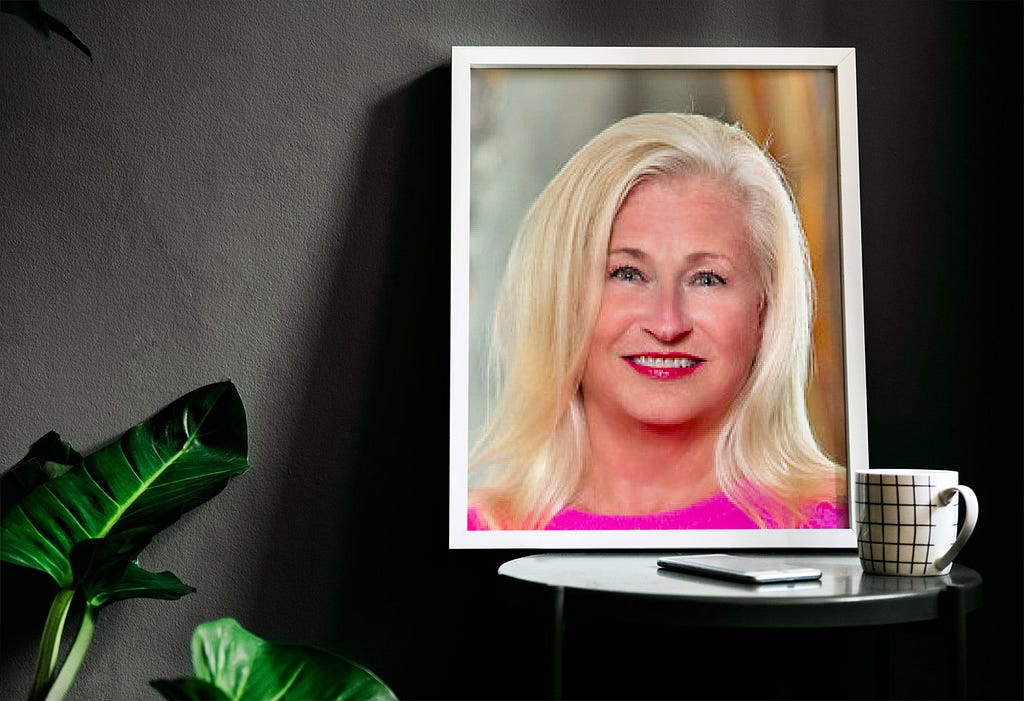Social Impact Heroes: Why & How Tish Hevel of the Brain Donor Project Is Helping To Change Our World

That there are way too many people suffering through horrible neurological disorders than we’re aware of. As many as one in five Americans has a brain disease — and that is someone in EVERYone’s circle. Dementia, serious mental illness, traumatic brain injury — the list goes on and on and its ripple effects are incredibly costly in terms of quality of life alone. We must move urgently to make sure scientists have everything they need to cure these devastating diseases.
As part of my series about “individuals and organizations making an important social impact”, I had the pleasure of interviewing Tish Hevel, CEO and Founder of the Brain Donor Project.
Tis Hevel founded The Brain Donor Project to support the NeuroBioBank of the National Institutes of Health (NIH) in its mission to make available high-quality, well-characterized donated brain tissue to neuroscientists. The Brain Donor Project simplifes the process of becoming a brain donor and raise awareness of the critical need for people to donate their brains when they die.
Thank you so much for joining us in this interview series! Can you tell us a story about what brought you to this specific career path?
My dad passed away in 2015 and we donated his brain for neuroscience research. At the time, it was complicated, so when friends asked me to help them arrange to be a brain donor, I called the Director of the National Institute of Neurological Disorders and Stroke at the NIH and asked if I could help make it easier for people. I learned there’s a critical need for this precious tissue to solve the mysteries of brain disease, and that there was a way for us to make an impact. I had worked previously as a journalist, a PR professional, and in the non-profit world, so I sort of felt like all those experiences led me in this direction. We formed The Brain Donor Project to raise awareness of the serious need and to make it easier for people to become brain donors when the time comes.
Can you share the most interesting story that happened to you since you began leading your company or organization?
Every day we hear from families who want to donate a loved one’s brain so that future families won’t have to suffer as they have, watching someone live with a neurological disorder. It’s humbling, heartbreaking and inspiring. The generosity and kindness shown by people going through a devastating loss — and wanting to do something for strangers — is so special. And it makes it apparent that so many people care so deeply about making the world a better place.
Can you share a story about the funniest mistake you made when you were first starting? Can you tell us what lesson you learned from that?
Not a lot of big laughs in this business…
Can you describe how you or your organization is making a significant social impact?
More than 15,000 Americans have now taken steps to donate their brains when they die…and that will advance the science of brain disease. Scientists need this precious tissue to find breakthroughs in neuroscience that will lead to better ways to prevent, diagnose, treat and eventually cure these disorders. And they’re not going away on their own. On the contrary. As we age, the chances of being diagnosed with a neurologic disease or disorder increase. Since we’re living longer than ever, the burden will be tremendous without some progress.
Can you tell us a story about a particular individual who was impacted or helped by your cause?
A few years ago, a woman in Columbus Ohio registered her husband to be a brain donor as he was dying from dementia. She discussed it in advance with her daughter and her daughter’s five sons, the youngest of whom was in middle school. And then they talked about it more when the husband passed, and they were comforted by their decision to contribute to science. After listening to all the discussions, one day the youngest boy seemed to completely understand what was going on and told his grandmother that what she was doing could make it so that some boy down the road wouldn’t have to say such a difficult goodbye to his grandpa. His insight was very moving to everyone. And he seemed to have a deep understanding of the particular tragedy of brain disease. Now that young man is starting on his college path to becoming a neuroscientist. And he gives his grandmother plenty of credit for helping him see the need to find these answers.
Are there three things the community/society/politicians can do to help you address the root of the problem you are trying to solve?
1. Make arrangements now to donate your brain when the time comes. Visit www.braindonorproject.org and complete the “Brain Pre-Registration” form online. Tell your family about your plans because they’ll play a key role in seeing to your wishes.
2. Politicians can help by making brain donation a part of organ donation. Right now, brain donation is not included in organ donation, so separate arrangements need to be made. Many people assume that by checking the organ donation box on their driver’s license, their brain will also be donated. If federal law would enable an opt-in or opt-out for brain donation, it would lead to a significant increase in the supplies of brain tissue available for research.
3. A simple way to invite any participants in clinical trials, research or genetic testing to consider becoming a brain donor would help scientists get access to tissue for which there is precious pre-clinical data available. That makes those particular brains significantly more valuable and it would help “close the loop” on much research, thus advancing this science rather significantly.
How do you define “Leadership”? Can you explain what you mean or give an example?
It’s the decision to take a stand and work to achieve a goal. It’s the ability to convince other people to join you because they also have a stake in the project’s success. It is empowering folks to stand in support.
What are your “5 things I wish someone told me when I first started” and why. Please share a story or example for each.
1. That there are way too many people suffering through horrible neurological disorders than we’re aware of. As many as one in five Americans has a brain disease — and that is someone in EVERYone’s circle. Dementia, serious mental illness, traumatic brain injury — the list goes on and on and its ripple effects are incredibly costly in terms of quality of life alone. We must move urgently to make sure scientists have everything they need to cure these devastating diseases.
2. That parents of children with rare diseases are the strongest advocates known to man. So many people will pivot their entire life to help their kids get the answers they need to live a meaningful life. People who didn’t know the first thing about it have lobbied congress, raised money/awareness and forced government and industry to change rules and long-held policies to move science forward. THEY are the true heroes.
3. That people are overwhelmingly generous and anxious to help advance science in any way they can once they’ve gone through helping a loved one with a terrible brain disease. I was not prepared for the kindness people show at the worst time of their lives.
4. That funding will be challenging when a non-profit occupies an unusual space. Since The Brain Donor Project does not fund research, nor conduct research directly it falls outside of normal “lanes” for many funders. There’s not really a category for organizations that help provide the most valuable resource in neurological science — donated brain tissue — so identifying sustainable funding will be really hard.
5. That overcoming assumptions about brain donation is the largest part of our outreach. Specifically, it entails convincing people that:
• Brain donation is not a part of organ donation — separate arrangements need to be made
• Body donation does not include brain donation for neurologic research. Again, separate arrangements need to be made
• It isn’t disfiguring — the brain is removed through the back of the head so that an open casket is still an option
• It doesn’t cost the family when donating to a brain bank of the NIH
• So-called neurotypical — or non-diseased brains — are just as valuable to donate
You are a person of enormous influence. If you could inspire a movement that would bring the most amount of good to the most amount of people, what would that be? You never know what your idea can trigger.
I truly believe that learning more about the human brain and its functions will help us all better serve humanity. Curing neurological disease will allow people to life a full life and contribute to the betterment of our world. What could be more optimal? And brain donation will get us there.
Can you please give us your favorite “Life Lesson Quote”? Can you share how that was relevant to you in your life?
The only thing that matters in life is our ability to positively impact the lives of others. That was pretty much my dad’s mantra and I believe it. Everything else is secondary.
Is there a person in the world, or in the US with whom you would like to have a private breakfast or lunch with, and why? He or she might just see this, especially if we tag them.
Wish it was that easy. Another day with my dad would be the best. I know he’d be very proud of what he’s inspired in The Brain Donor Project. And it speaks to what was important to him.
How can our readers follow you on social media?
Twitter: @braindonorproj
Facebook: https://www.facebook.com/braindonorproject/
IG: @braindonorproject
LinkedIn: https://www.linkedin.com/company/brain-donor-project/
Thank you for sharing your insights and predictions. We appreciate the gift of your time and wish you continued success and wellness.
Social Impact Heroes: Why & How Tish Hevel of the Brain Donor Project Is Helping To Change Our… was originally published in Authority Magazine on Medium, where people are continuing the conversation by highlighting and responding to this story.

